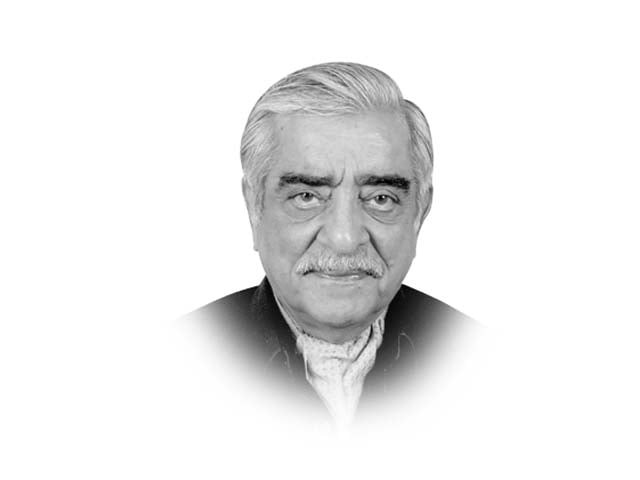The Haqqani affair and its aftermath
The media has taken on face value Mansoor Ijaz's claim, failing to critically analyse the claims.

The Haqqani affair and its aftermath
If there was a serious inquiry it may lead us down paths that would be even more explosive than anything that has gone in the past, including the Hamoodur Rahman Commission. Consider if you will, what would happen if there were to be a serious inquiry into the exchanges that then Prime Minister Nawaz Sharif had with President Clinton in the famous White House tea party on July 5, 1999, after a way out of the Kargil fiasco had been found in the Blair House talks on July 4, 1999. What did his representative, Mr Shahbaz Sharif have to say to his American interlocutors when he followed up on the Nawaz-Clinton meeting a few weeks later? Were there calls for foreign interference in the brewing civil military struggle?
What would emerge if there were to be an inquiry into the Saudi ambassador’s role in the 1977 stand-off between Prime Minister Bhutto and the Pakistan National Alliance? What would be discovered as being the foreign power role in the July 5, 1977 military takeover?
What would emerge if there were to be an inquiry into the whys and wherefore of the grant of political asylum and subsequently citizenship to Altaf Hussain in the UK?
What would inquiry show when there is an examination of the role foreign interlocutors played in the so-called reconciliation between Mohtarma Benazir Bhutto and then President Musharraf?
And yet all these and a whole host of other issues would be relevant because the inquiry would focus on how Pakistani individuals or leaders have invited or tolerated foreign interference in Pakistan’s internal affairs. Since the memo is seen as a particularly flagrant example of such an invitation, it would require an examination of such past precedents. This is a can of worms that is best left unopened.
It goes without saying, of course, that a world that already sees Pakistan as dysfunctional perceives this latest ‘crisis’ as further evidence that Pakistan has yet to get its act together and to act as a cohesive nation which recognises its national interests and can pursue them through skilful diplomacy. A prime requisite of such diplomacy would be the ability for critical analysis.
If this episode has shown one thing, it is that we are incapable of such critical analysis. Consider: everyone in our media has accepted at face value the bbms exchanged between Mansoor Ijaz and Husain Haqqani as evidence of the fact that the memo was finalised on May 9. No attention appears to have been paid to the fact that General Jim Jones, the deliverer of the memo, says that it was delivered on May 10 and that this was less than a week after he had received it. This would suggest that the memo, in fact, was drafted and sent to Jim Jones much before May 9, perhaps as early as May 3. The transcripts that need to be seen are therefore those of exchanges between Mansoor and Haqqani, if they exist, and those between Mansoor and his American friends from May 3 onwards. Is there anything in these messages that confirms Haqqani’s authorship of the memo and, if so, what are the subsequent changes that have been made in the memo and by whom? Who, if anyone, did the tweaking? Jim Jones’ laconic communication with the Pakistan media does not suggest that he received a series of memos and forwarded only the last one he received. Perhaps it was so, but this needs to be established.
Taking the transcript at its face value, M’s (Mansoor Ijaz’s) message suggests that there be a middle option i.e. only a verbal communication and that nothing be put in writing. HH (Husain Haqqani) evidently tells M that the middle option is the preferred one. So how did this change?
Look at the memo itself. As some in our media have pointed out, the armed forces’ leadership on May 3-4, and for weeks thereafter, was on the defensive, desperately trying to explain that it was neither complicit nor incompetent. The last thing they were thinking of was a coup. This was known in Islamabad as much as it was in Washington. Surely Husain Haqqani, whose worst enemies do not describe him as stupid, would not talk of a coup. He could have, however, spoken of the Abbotabad incident shattering the mystique of the armed forces and then suggesting that this was an ideal opportunity for the civilian administration to assert control over them. This would make sense even if it would find, in my view, no buyers in the Pentagon or any other branch of the American administration since, by every assessment, the civilian administration, beset with its own problems, was incapable of asserting such control no matter how strong the American backing. The flawed assumption in the unsigned memo doomed it to the fate it suffered — a consigning to the wastebasket
Husain Haqqani, in maintaining contact with Mansoor Ijaz, was guilty of a serious error of judgement even if he had nothing to do with the memo. His departure from the scene could be justified on this account alone. What made it inevitable was that he was not seen in Pakistan as being able to represent the views of all the centres of power in the country. This episode has served its purpose if it secured better representation for Pakistan in its most important diplomatic post. But this should not mean the loss of the faculty for critical analysis. It should not mean that our media deliberately avoid an effort to separate the chaff from the wheat, to examine whether there was, in fact, a fire behind the smoke and, if so, what was the nature of the fire. In the critical times that lie ahead, this is what we cannot afford.
Published in The Express Tribune, November 26th, 2011.
















COMMENTS
Comments are moderated and generally will be posted if they are on-topic and not abusive.
For more information, please see our Comments FAQ